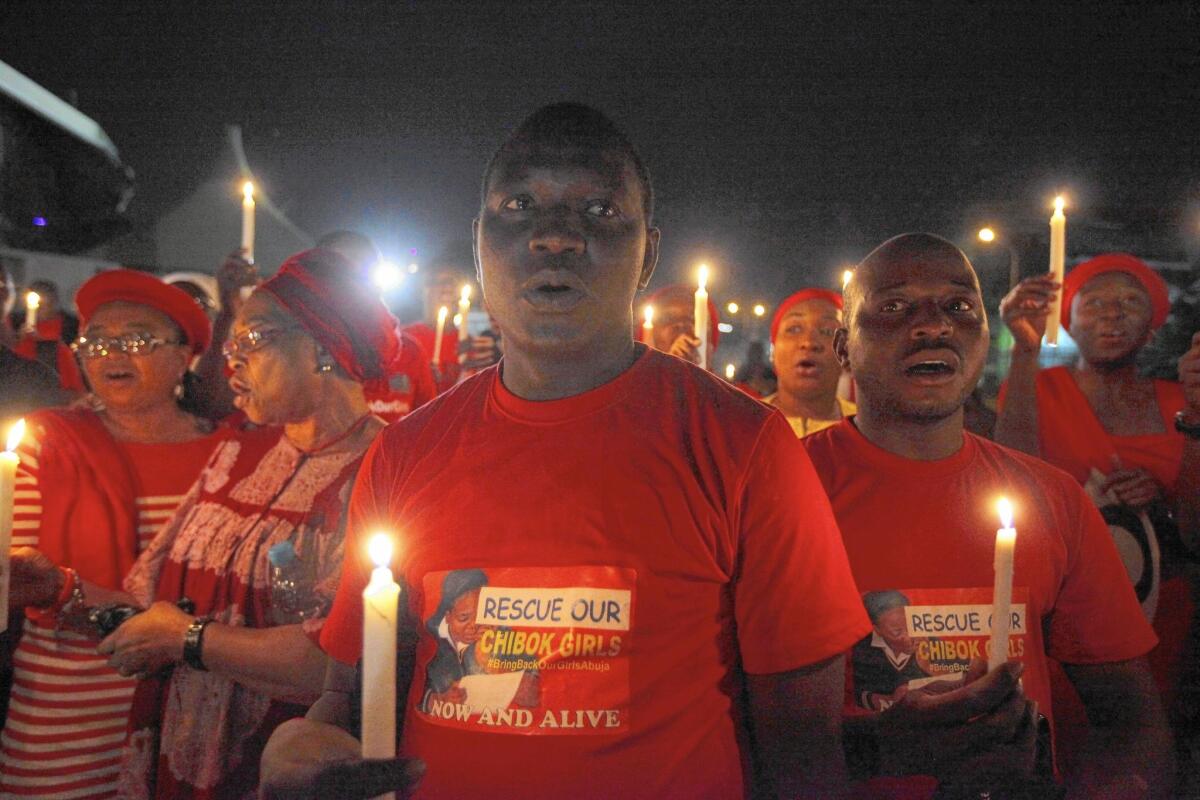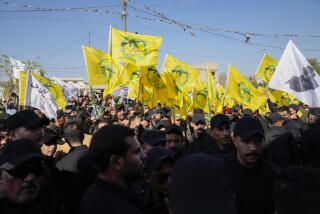Year in Review: Islamic State leads the scourge of militant Islam

Year after year, the acts of Islamic militants grow more terrifying. Witness the 2012 point-blank shooting of Pakistani schoolgirl Malala Yousafzai and the random slayings a year later of 60-plus shoppers at an upscale mall in Kenya.
The year 2014 was no exception. The newly dominant zealots calling themselves Islamic State produced gruesome videos of their beheading of aid workers, journalists and captured fighters. In April, Boko Haram abducted more than 270 Nigerian girls and dispatched them to sexual enslavement. As the year drew to a close, the Pakistani Taliban slaughtered nearly 150 students and staff at a military school in Peshawar.
It is a virtual certainty that freshly incomprehensible horrors are looming in 2015. Islamic State’s executions have elevated its stature in the extremist world, drawing in thousands of new recruits, and its coffers have been filled with the proceeds of bank robberies and looting from their unimpeded roll across northern Iraq.
Terrorism spread in 2014 to unexpected venues. “Lone wolf” attacks by militant wannabes jolted Canadians and Australians from their relative serenity. The death tolls were mercifully small, with two killed in the October attacks in Quebec and Ottawa and two more as in the siege of a Sydney cafe in mid-December. But the incidents probably were no less disturbing to citizens’ sense of security than were the Sept. 11 terrorist attacks, the Madrid commuter train bombings in 2004 or the London transit system attacks a year later.
The most shocking attacks in 2014 occurred where Islamic extremism has put down deep roots.
Boko Haram, the Islamist militia whose name translates to “Western education is a sin,” stunned the world with its brazen raid on the Nigerian girls’ school in the northeastern city of Chibok, which is home to many Christians. All but a few of the kidnapped girls remain missing and militia leaders said they have converted to Islam and been forced into marriage.
Boys attending Christian or secular schools in former British colonies in Africa also have been slain for their beliefs. Thousands unswayed by the extremist Islam embraced by Boko Haram and Somalia’s Shabab militia have been killed in a decade-long epidemic of summary executions and bombings.
Islamic State rocketed to international attention in the spring when it seized Iraq’s second-largest city, Mosul. Foreign diplomats, nurses, truck drivers and construction workers were taken hostage and released for undisclosed ransoms.
Bankrolled by the blood money, bank looting and revenue from seized oil facilities as its fighters surged south, the extremist group overran a third of Iraqi and Syrian territory, which they have proclaimed a transnational Muslim caliphate.
Hundreds of thousands fled Islamic State’s onslaught, inundating government-held towns in both countries and in neighboring Turkey and Jordan. Men who stayed behind were executed or forcibly recruited; women and girls were sent into domestic slavery as cooks and procreators.
The Islamist militants’ shock tactics were spotlighted in their August video depicting the beheading of American journalist James Foley, one of at least 20 reporters who had gone missing while covering the war in Syria. The black-clad executioner spoke in English with a British accent as he warned that other Western captives would meet the same fate unless the United States and its allies ceased airstrikes on Islamic State forces.
Foley’s grisly death was followed by similar executions of American freelance journalist Steven Sotloff, British aid workers David Haines and Alan Henning and U.S. Army veteran-turned-relief worker Peter Kassig.
President Obama called the killings acts of “pure evil by a terrorist group that the world rightly associates with inhumanity.” British Prime Minister David Cameron called the perpetrators “monsters.”
But the brutality that sickened the world emboldened disturbed and violent misfits from around the globe to join Islamic State. Its ranks have swelled with as many as 15,000 foreign fighters, according to the Soufan Group of security analysts, lured into the terrorists’ mission by the promises of global notoriety and martyrdom. The recruits threaten to take Islamic State’s suicidal missions to less effective insurgencies in Yemen, Libya and the Persian Gulf, widening the war against those who don’t share their fanatical values.
The militants’ success in using savagery as a recruitment tool may be responsible for the fighters’ recent recovery of territory abandoned under U.S.-led airstrikes. Islamic State returned to the oil refinery town of Baiji in late December, just weeks after being driven out by aerial bombardment and Iraqi ground forces. The militants have also rebounded in eastern Syria and along Turkey’s southeastern border.
A glimpse of life under Islamic State was provided in December by 74-year-old Juergen Todenhoefer, a veteran German journalist who secured rare permission to visit Mosul in late autumn. He described the proclaimed caliphate covering largely desert territory the size of Britain as swept by “an almost ecstatic enthusiasm” for the occupiers.
As brutal as Islamic State’s treatment of perceived enemies has been, Iraq’s Sunni Muslims were so marginalized under then-Prime Minister Nouri Maliki, a Shiite Muslim, that they have abetted the foreign fighters as the lesser evil.
“They are so confident, so sure of themselves,” Todenhoefer said of Islamic State fighters. “This is a force more dangerous than people realize.”
More to Read
Sign up for Essential California
The most important California stories and recommendations in your inbox every morning.
You may occasionally receive promotional content from the Los Angeles Times.











